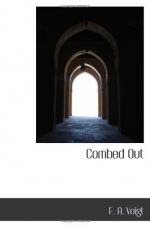At length a fitful slumber came upon me and a confusion of rotting bodies swarming with monstrous lice passed before my closed eyes. I was fully awake long before reveille, sleepy and unrefreshed, and when reveille came we received orders to move within two hours.
Four of us and one N.C.O. were left behind to load a lorry. And then we, too, packed up and set out to follow the unit.
Thinking to take a short cut across country we ascended the hill-slope, jumping and clambering across shell-holes and striding through long grass and weeds. Now and again we would chance upon some narrow winding track that soon lost itself again amid the tangled growth.
Low clouds burdened the sky and a fine rain began to fall. The top of the hill was hidden in grey mist.
We passed a heap of broken concrete blocks from which the twisted ends of iron rods projected. A little further on a concrete shelter stood intact except for deep vertical fissures. I peered into the narrow entrance that sloped steeply down. I slipped in the soft mud, but by stretching out my arms and clasping the outer wall I just saved myself from falling flat on to a rotting corpse that lay half-immersed in greenish-black water. I drew slowly back, feeling sick with horror.
As we climbed the hill-side the devastation increased. The trees and bushes were torn, splintered and uprooted. Only a few grey trunks remained standing like scarred, bare poles. We approached the summit and crossed shell-hole next to shell-hole, for not a square yard of ground had remained untouched. Some of the holes were wide and deeply funnel-shaped, others were shallow, and others were hardly distinguishable, the earth having been churned and tossed up time after time. On the very top of the hill, there was nothing left of the trees that had densely clothed it a few months before, except fragments of wood and stringy lengths of root. Even the grass and weeds had been destroyed and blasted by the bursting of innumerable shells.
We walked along the crest between upright bundles of splinters that projected from the ground in two parallel rows—all that remained of an avenue of pines and larches.
We descended the further slope by a narrow gulley. Here the shell-holes were less frequent. A miry path led through an abandoned camp—a chaos of riddled and shattered boards and contorted iron sheeting. Dead Frenchmen were lying everywhere. From a drab heap of mud and clothing a human arm projected. The terminal finger-joints had dropped off. The blackened skin was drawn tightly over the back of the hand which seemed to clutch frantically at some invisible object.
A little further on two soldiers were scraping the soil with sticks.
“Gorblimy—’e ain’t ’alf rotten—puh—don’t ’e stink! I ’ope ’e’s got summat in ‘is pockets arter we’ve bin takin’ all this trouble.”
“Yer never find much on these ’ere Froggies, the rotten bastards. They don’t ’ardly get no dibs [money, pay]. Canadians and Aussies—them’s the blokes yer want ter look for. Fritz ain’t so bad neither. I got a bloody fine watch orf a Fritz last year down on the Somme—sold it to an orficer for thirty bleed’n’ francs!”




